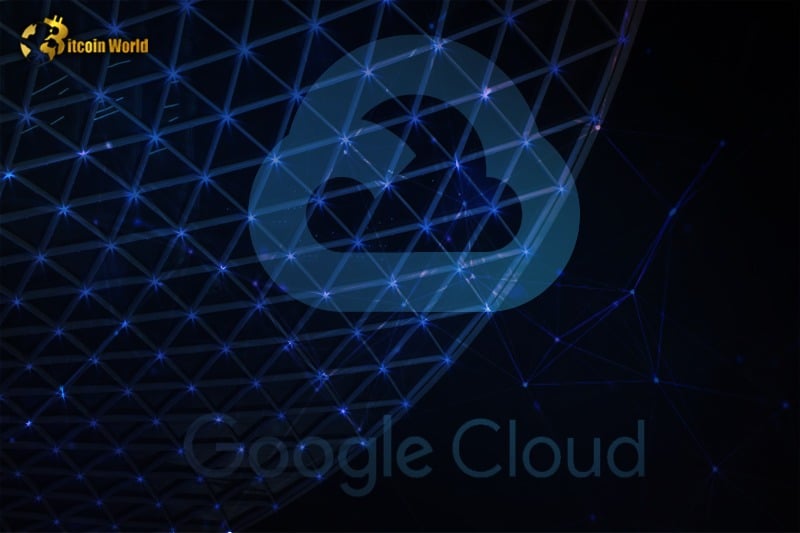In the ever-evolving world of Web3 and blockchain technology, collaborations between industry giants and innovative networks are always exciting news. Recently, Polygon, a leading Ethereum scaling solution, announced a significant partnership that’s sending ripples through the crypto space. Ready to find out what’s causing the buzz?
Google Cloud Joins Polygon Network as Validator: What Does It Mean?
Imagine the robust and reliable infrastructure that powers everyday services like YouTube and Gmail. Now, picture that same powerhouse being leveraged to enhance the security of a blockchain network. That’s precisely what’s happening with Polygon!
On September 29th, Polygon Labs officially declared that Google Cloud has become a validator on the Polygon proof-of-stake (PoS) network. This isn’t just a casual endorsement; it’s a deep integration that brings Google Cloud’s formidable infrastructure directly into the heart of Polygon’s operations.
Think of it this way: Validators are the guardians of a blockchain network. They are responsible for verifying transactions and maintaining the network’s integrity. By becoming a validator, Google Cloud joins a select group of over 100 entities ensuring the smooth and secure operation of Polygon’s layer-2 Ethereum network.
Polygon Labs enthusiastically shared the news on X (formerly Twitter), stating:
The formidable infrastructure that underpins @YouTube and @gmail is now instrumental in enhancing the security and efficiency of the Ethereum-for-all Polygon protocol. https://t.co/rFRC354Q6i
— Polygon (Labs) (@0xPolygonLabs) September 29, 2023
Why is Google Cloud Becoming a Polygon Validator a Big Deal?
This partnership is significant for several reasons, highlighting the growing maturity and mainstream adoption of blockchain technology:
- Enhanced Security: Google Cloud’s robust infrastructure significantly strengthens Polygon’s network security. Leveraging the same technology that powers Google’s massive services brings an unparalleled level of reliability and resilience to Polygon.
- Increased Credibility: Having a tech giant like Google Cloud as a validator adds substantial credibility to the Polygon network. It signals to developers, users, and institutions that Polygon is a serious and trustworthy platform.
- Decentralization Commitment: Google Cloud’s participation underscores its commitment to decentralization within the Web3 space. By actively contributing to network security and governance, they are playing a vital role in shaping a more decentralized future.
- Mainstream Adoption: This collaboration is a powerful indicator of blockchain technology moving further into the mainstream. Google Cloud’s involvement can encourage other large enterprises to explore and participate in Web3 ecosystems.
What Do Validators Actually Do?
Validators are the backbone of proof-of-stake blockchains like Polygon. Their roles are crucial for maintaining network health and security:
- Transaction Verification: Validators are responsible for verifying and validating transactions on the network, ensuring that only legitimate transactions are added to the blockchain.
- Node Operation: They operate nodes, which are computers that maintain a copy of the blockchain and participate in network consensus.
- Staking MATIC: Validators stake MATIC (soon to be POL) tokens, the native token of Polygon, as an economic commitment to the network’s security. This stake can be slashed if they act maliciously or fail to perform their duties properly, incentivizing good behavior.
- Participating in Consensus: Validators participate in the proof-of-stake consensus mechanism, which is the process by which the network agrees on the validity of new blocks and transactions.
Google Cloud’s Perspective: Security, Governance, and Decentralization
Google Cloud Singapore, through their X account, confirmed their validator role and emphasized their dedication to Polygon’s core principles:
We're excited to be serving as a validator on the @0xPolygon PoS network, contributing to its security, governance and decentralization alongside 100+ other validators. This builds on our ongoing strategic collaboration with @0xPolygonLabs. Check out our video https://t.co/z0N8399n16 pic.twitter.com/mB2jGk457V
— Google Cloud Asia Pacific (@GoogleCloud_APAC) September 29, 2023
They are not alone in this endeavor. Google Cloud joins other notable validators like Deutsche Telekom, showcasing a diverse and robust network of participants. Google Cloud also highlighted their “ongoing strategic collaboration” with Polygon Labs, further cemented by their YouTube video titled “Polygon Labs: Pioneering a Web3 Future for All,” released by Google Cloud Asia Pacific.
Polygon 2.0 and the Future
This validator partnership comes at an exciting time for Polygon. Polygon Labs recently announced its ambitious “Polygon 2.0” initiative, a major upgrade aimed at revolutionizing the network.
According to reports, “Phase 0” of Polygon 2.0 is already underway, introducing Polygon Improvement Proposals (PIPs) 17-19. These PIPs outline significant changes, including:
- Token Upgrade: PIP 17 proposes transitioning from the current MATIC token to a new token called POL.
- Technical Specifications of POL: PIP 18 delves into the technical details and functionalities of the new POL token.
- Gas Token Enhancement: PIP 19 focuses on improving gas tokens within the Polygon ecosystem.
These transformative changes are slated to begin in the fourth quarter of 2023, setting the stage for a more advanced and efficient Polygon network.
Conclusion: A Secure and Scalable Web3 Future with Polygon and Google Cloud
Google Cloud becoming a validator on the Polygon network is more than just a partnership; it’s a powerful validation of Polygon’s technology and vision. By leveraging Google Cloud’s infrastructure, Polygon is poised to offer even greater security, reliability, and scalability to its users and developers. This collaboration marks a significant step forward for both Polygon and the broader Web3 ecosystem, paving the way for a more secure and accessible decentralized future. As Polygon 2.0 unfolds, expect to see even more innovation and growth from this dynamic network, now fortified by the might of Google Cloud.
Disclaimer: The information provided is not trading advice, Bitcoinworld.co.in holds no liability for any investments made based on the information provided on this page. We strongly recommend independent research and/or consultation with a qualified professional before making any investment decisions.


